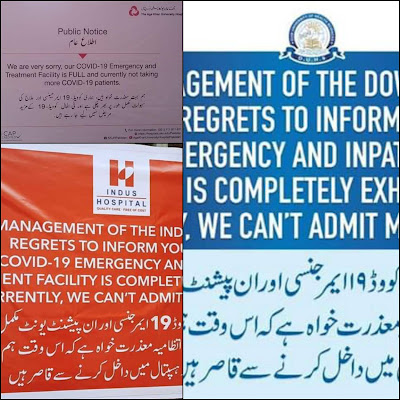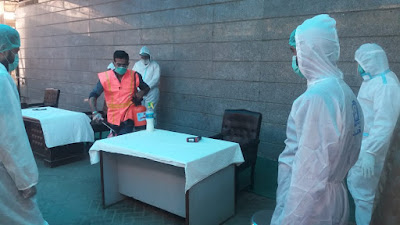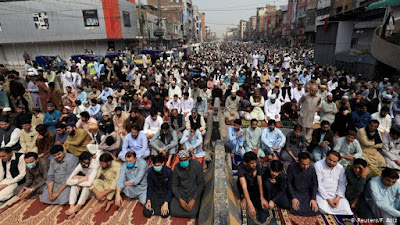Experts, civil society blast government policies for COVID-19 onslaught
KARACHI: At a time when coronavirus or COVID-19 has entered in its fourth month in the country now, it seems to have outmuscled almost all the stakeholders in the power corridors and people in the streets and districts equally, public life concerns look for an appeasing climax in the war against the virus, stressing appropriate planning based on assessed risks and honest implementation of the relevant measures.

The experts in medicine and civil society members, reached by PNFS, unanimously agreed that Pakistan, on the whole, has failed to contain the coronavirus onslaught. They opined that the pandemic has exposed the weaknesses of governments at all levels and now it’s the time to address their negligence and evolve well thought of strategies and ensure a flawless translation of those, not only in the case of coronavirus but also for other contagious and non-contagious diseases.
A civil society activist and philanthropist, Nadira Panjwani, did not mince words in stating that the country has failed miserably to manage this COVID-19 pandemic. “Flawed policies, poor implementation and most importantly lack of awareness due to poor education have contributed to exacerbating this disease problem.”
She was of the opinion that the Sindh government had done very well in terms of its understanding of the lethal virus and the steps it took for controlling it. “It was a misfortune that certain attitudes of governments in other provinces also rendered the Sindh’s measures ineffective.”
Nadira Panjwani also stressed for harmony among the federal and provincial governments policies and a developing a rapid response measures for dealing the pandemic, which seemed to be attaining another peak and might stay for long in the country.
Coming to the way forward, after having watched management of a few educational and health settings in Karachi, she didn’t foresee any solid solution to the problem in the short run. “Our best bet is to work on preventive measures and mass awareness and better enforcement of public safety actions. A valid vaccine may be several years away.”
One of the commissioners at the Sindh Healthcare Commission, Dr Khalid Hussain Sheikh, who served the Sindh health department in higher capacities also, attributed the COVID-19 failure to the reported difference of opinion concerning lockdown between the federal and provincial government of Sindh.
“Now we have to live with the virus,” he added saying people need to raise their immunity against the diseases and the government has to ensure strict preventive measures while waiting for the vaccine and development of herd immunity.
Herd immunity, according to the GAVI Alliance (formerly the Global Alliance for Vaccines and Immunization), is the indirect protection from a contagious infectious disease that happens when a population is immune either through vaccination or immunity developed through previous infection.
“Once herd immunity has been established for a while, and the ability of the disease to spread is hindered, the disease can eventually be eliminated. This is how the world eradicated smallpox, for example.”
“The new coronavirus has a lower infection rate than measles, with each infected person passing it on to two or three new people, on average. This means that herd immunity should be achieved when around 60% of the population becomes immune to COVID-19.”
A veteran physician, Dr K M Nawaz Butt, remarked that people never took COVID-19 seriously for two reasons, religious fanaticism and non-serious attitude of the government at the centre.
“Enforcement of preventive measures and other restrictions can only bear fruits if people in general follow those,” he added and lamented that government by itself was confused on COVID-19 development and as such positive results could not be anticipated.
“Bangladesh too is religious but the state there speaks with one voice. They have handled COVID-19 much better than us,” the former publication and media personnel at the College of Physicians and Surgeons Pakistan (CPSP) acknowledged.
He further said that at this given time the state should follow the suggestions of doctors, particularly epidemiological specialists, of all provinces and develop a will to enforce the way forward. “Economic recovery is bound with healthy nation; a sick nation cannot give healthy economy,” he asserted.
An expert in environmental affairs and right activist, Saquib Ejaz Hussain said: “Since we have always failed to control the deadly air pollution which is the source as well as carrier for all viruses and illnesses, we have, therefore, failed to contain COVID-19 too.”
“Above all, our health system has collapsed because of being held hostage in the hands of corrupt politicians. Then the restrictions were enforced half heartedly because our so-called institutions do not have the teeth.”
He also undermined some of the media and religious leaders, who according to him, were disseminating confused messages among public about corona. “We are heading towards a terrible end,” he remarked while suggesting a foolproof lockdown orders with the support of army.
Former Director General of the Sindh Health Services and a public-health expert, Dr Masood A Solangi, said that the local strategists and the managers on ground failed to deliver because the corona issue got politicized while the leaderships in the provinces and in the federal government were not on same page.
“Leave alone Sindh. Even Punjab and KPK ignored federal government’s directives on lockdown issue,” he added stressing the need for evolving a clear-cut policy with the involvement of federal and provincial governments to combat the coronavirus issue before it was too late.
Prof Dr Farhat Jafri of the Karachi Medical and Dental College (KMDC) pointed out to the failure on the parts of the federal and provincial governments, particularly the Sindh government, which had become evident.
“We have failed as there was lack of coordination between the federal and Sindh governments and I fear now the country is going to try the herd immunity option.”
Urging the authorities at the helm of affairs to accept the given scenario by heart and mind, the professor reminded for educating the masses to adopt standard operating procedures in their daily life.
“The government should improve its existing health infrastructure and further engage the private sector to overcome the upcoming crisis. We need to establish corona specific health care facilities and engage the local bodies at the union council level in fight against COVID-19 epidemic. The government should also take measures, like decreasing the prices of foodstuff for the poor so that they could buy fruits, vegetable and meat at special shops, ensuring opportunities for people to improve their immunity against the disease,” the professor of community medicine, suggested.
Dr Abdul Malik of the Neurology Awareness and Research Foundation reckoned that the COVID-19 onslaught was gaining momentum due to the poor healthcare infrastructure, managed and overseen by irresponsible and incompetent quarters.
He demanded declaration of health emergency in the Sindh province for a month or so. “Provision of more COVID-19 testing facilities, hospital beds and availability of ventilators there must be the top priority of the government.”
Moreover, he continued, the government should ensure protection of doctors from the virus onslaught and human assaults at hospitals where they worked.
An environmental consultant and a civil society activist, Saleem-uz-Zaman, regretted that a failure against COVID-19 had always seemed on the cards in the prevailing circumstances.
“What other options did we have for a country where 10-15 people live in a 60 square yard house; majority of population live below poverty line, while government cannot feed people.”
He referred to some officially unannounced attempts to achieve herd immunity in the European countries and said that the difference between them and countries like Pakistan was that their government as the Europeans, during the months of lockdown, had upgraded their healthcare system, added ventilators and made policies to handle the crises.
“They are expecting second wave of COVID-19, but are hopeful that with better arrangements in place now they will be able to limit the mortality rates. During the lockdown period they fed their people with 2,000 pounds per citizen,” he added and questioned “what did we do in the lockdown period?”
He thought that the federal and the Sindh governments were equally responsible for the COVID-19 disaster. “They just tried to make headlines, did no work practically for the upgradation of healthcare facilities.”
Dr Muhammad Rafiq Khanani, President of Infection Control Society Pakistan, observed that the country and its provinces failed to contain the coronavirus at least three times.
First, despite knowing the coronavirus was spreading fast from China to other countries, we did not ensure proper measure at the Taftan borders-quarantine in the case of pilgrims returning from Iran, he added saying on the other hand the authorities did not stop tableeghi jamat ijtama at Raiwind (March 10-13), which later, according to the expert, proved a major source of the COVID-19 infections.
“Thirdly, first lockdown restrictions were effective towards containment of the disease but the relaxation before Ramazan resulted in the fast speeding up of new cases we are seeing these days,”
Dr Rafiq Khanani added and remarked that the second relaxation given before Eid and afterwards will result in spread of more infections in the next couple of weeks or so.
He blamed the federal government for immigration and border security lapses. Due to federal government stance against lockdown, Sindh was forced to do relaxation as it had become popular demand. “Irony was that SOPs were developed mostly by non-concerned quarters while no infection control experts were approached or consulted.”
He lamented that the restrictions were not enforced or observed half-heartedly as they were not very thought of. “The only solution out of this is absolute lockdown, much stricter than what was witnessed in the last week of March. The federal government is reportedly working on the philosophy of herd immunity, which means infecting 60-70% of population, which will be about 140 million people.”
“If we take even one per cent mortality, the number will become 1.4 million deaths and 7 million hospitalization, 5% moderate to severe disease” the expert feared.
He believed that the only ray of hope, although not very well supported by scientific evidence, was natural slowdown of transmission due to high humidity, high temperature and high solar ultra violet index in the third week of July onwards.
“If our lockdown strategy is synchronized with these natural supporting factors the synergy will help in drastic reduction and we may bring the reproduction numbers of COVID-19 to 1.0 or less, which means gross decrease in numbers by September 2020”–PNFS









